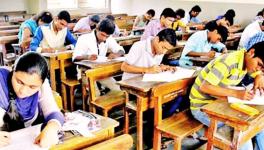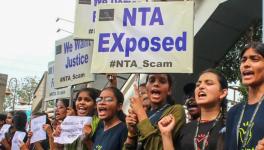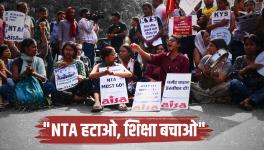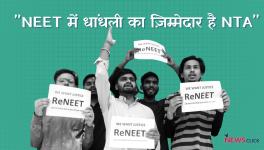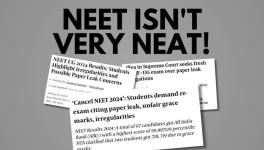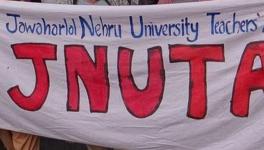One Nation, One Exam – An Unfolding Disaster
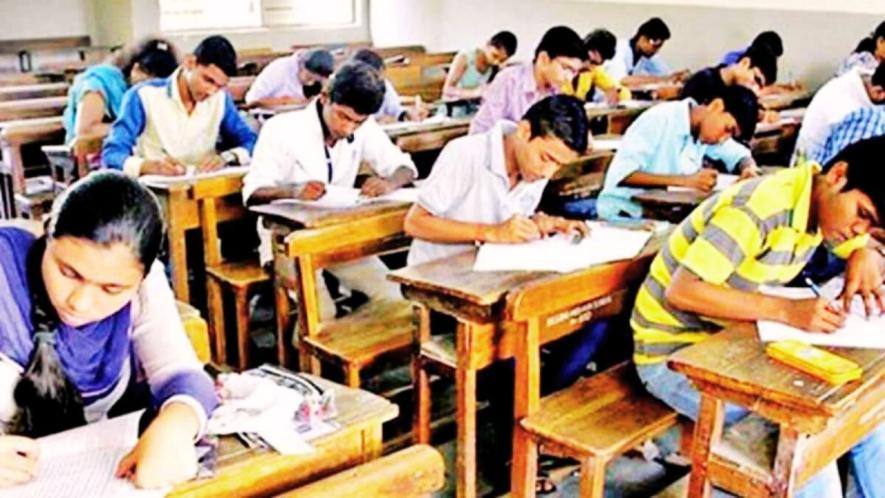
Representational Image. Image Courtesy: PTI
It has been a long time coming but finally it is here – the great modern examination system, often touted as being in line with global practices, has cracked. Although the medical courses entrance examination (NEET) has not yet been cancelled, but every day brings new revelations of gang(s) of paper solvers, official shenanigans like wholesale ‘grace marks’ for alleged delay in starting exam at particular centres, and so on.
The government is scrambling to fire-fight with an investigation committee of technocrats, sacking the chief of National Testing Agency (NTA), re-examination of some aspirants, and lofty promises of fixing the crumbling edifice once and for all.
Even while assuring the lakhs of student examinees and their worried families that things are under control, the government has cancelled the UGC-NET examination that took place only a few days ago, and also the upcoming CSIR-UGC-NET and NEET-PG examination. It has not been revealed what prompted this. The Supreme Court has also got involved, as courts were facing a barrage of petitions ranging from individual grievances that were unresolved to systemic questions. It is another day in the life of New India.
Before our eyes, a consensus is being forged – the problem is corruption and inefficiency, and that will be fixed with a stringent law, fresh personnel, technical sophistication and faith in the government. The government is – expectedly - plugging this view and corporate media is doing its part, unearthing the stories of how papers were leaked, etc. Perhaps people will be willy-nilly convinced since they have no option.
But there are some deeper questions that are not being asked although students/examinees and their families have felt that these require answers too. These include:
* Has not the wholesale outsourcing of examination processes to private companies opened the flood gates to malpractice and corruption?
* Is computer-based testing fair and necessary? And, linked to this: is the system of Multiple Choice Questions (MCQ) a fair and valid means of testing academic levels?
* Is centralised testing (“One Nation, One Exam”) a fair and valid means of conducting such exams in a country as vast, diverse and unequal as ours?
Let us look at these issues, but only summarily because to get to the bottom of such complex issues the country really needs some kind of enquiry commission.
Outsourcing Evils
The NTA conducts exams for a large number of students – estimated at 1.23 crore in 2023, according to media reports. In all, 15 major exams are conducted, including NEET-UG, JEE, UGC-NET, CUET etc. Practically all of the work related to carrying out these exams across the country is outsourced. A look at the tenders issued by NTA, available on their website gives a glimpse of this. Private service providers undertake to conduct exams with their staff, all technical support, like IT systems and QR code-related work is similarly performed. Test papers appear to be made by unknown subject experts and finalised by a Test Development Committee. Before the NTA took over the responsibility of these exams, government bodies like CBSE and AICTE used to conduct these exams.
This obviously presents a huge opportunity for malpractices through the whole chain, but mainly at the lower end, around the centres where actual exams will be conducted. The rationale for having this outsourced system is the same as for outsourcing anywhere else – saving money and the belief that private entities will do the same work more efficiently at lower costs.
There is no evidence that shows this is actually the case, but the whole economy is now running practically on contracted or outsourced work. This is one of the gifts of the neoliberal thinking that blinds most policy makers in most countries.
Here it would be only fair to note that outsourcing has also taken place in conduct of various state-level exams, like State Selection Boards, and also in recruitment for sectors like the railways and banks, which have their separate bodies for examination and selection.
The malaise now visible in prestigious exams like NEET has surfaced repeatedly in states. An investigation by The Indian Express published earlier this year found at least 48 paper leaks cases in 15 states over the preceding five years. The paper estimated that these leaks “touched the lives of at least 1.4 crore applicants for about 1.2 lakh posts”.
CBT and MCQ Are Exclusionary
Computer Based Testing (CBT) and its corollary, MCQ (Multiple Choice Questions) are now the preferred choices to test the knowledge or aptitude of applicants for jobs as well as entry into professional courses. MCQ involves a straightforward question, the answer to which can be reduced to a word (or phrase) or a numeral. The exam can then be devised so that examinees have to complete, say, 180 questions in 200 minutes. The fastest way of doing this is to have an OMR (Optical Mark Recognition) sheet where the examinee will colour in the circles in front of the correct answer. This sheet can then be recognised by computerised devices and leads to fast evaluation. The question paper itself can appear on the computer on a dedicated site. Answers can also be submitted online in some cases.
This system has two clear problems: one is that the examinee has to become adept at finding answers to certain types of questions in the least amount of time, and second, the examinee has to have access to the internet and a suitable computer device or smartphone.
To become adept at answering MCQs fast, enormous rote-like practice is needed. This is provided by coaching centres that now exist across the country. For fees ranging from a few thousand to tens of thousands of rupees, these centres train students to beat the system.
The whole examination system and its twin, the coaching system, is thus out of bounds for poorer sections of society, marginalised communities, people staying in far- flung rural areas, and those who do not have access to a strong internet connection.
This is quite apart from the other big question: can knowledge and aptitude really be evaluated by such testing? Does it help in selecting students applying to study, say, medicine or engineering? In fact, many educational experts believe that it does not.
The tests are actually means of eliminating a large number of student/applicants. For example, out of 23 lakh NEET applicants this year, just about one lakh were to be selected. The CBT/MCQ system ensures smooth elimination of the remaining 22 lakh. The whole system has a rigged flavour to it – not rigged in the corrupt sense but biased against the disadvantaged.
Why Centralised Exams?
There has been a drive to centralise many aspects of Indian life in the past several years. This ‘need’ was felt from a purely administrative point of view in earlier regimes. Even the idea of having a central testing agency for conducting exams was first indicated in the early 1990s. Part of the reason for this was also the convenience – profitability – for the big business sections of society. Thus, the demand for a single tax, like the Goods & Services Tax (GST).
But, the “one nation, one everything” ideology has been given on a nationalistic energy by the Narendra Modi government – one election, one ration card, one health card, etc. Having one central examination for entrance to each of the professional streams was thus a natural candidate for implementation. This also satisfied those who were enamoured by the Western (read US) model of education and wanted its replication here, with the added benefit of opening the doors to foreign universities.
Be that as it may, the centralised all-India examination concept put paid to all regional aspirations and diversity, encroached upon the established systems of state-run exams and shifted both curricula and examinations away from any connection with ground realities. As mentioned earlier, it helped in eliminating large sections of students both, before the exam as well as through the exam.
Since most political parties (barring some regional ones and the Left) have no problem with the system, and since it is expedient to only talk about leaks without looking into the deeper reasons behind this failure, it appears that after some handwringing and teeth gnashing, some cosmetic changes will be done, various ‘gangs’ of paper leakers will be apprehended (they should be) and the matter will pass out of the news cycle, very soon.
What is needed is a full independent enquiry into the system of examinations itself, followed by a serious rethink and overhaul. Otherwise, the future citizens of the country will be condemned to live in a penumbra of ignorance.
Get the latest reports & analysis with people's perspective on Protests, movements & deep analytical videos, discussions of the current affairs in your Telegram app. Subscribe to NewsClick's Telegram channel & get Real-Time updates on stories, as they get published on our website.









